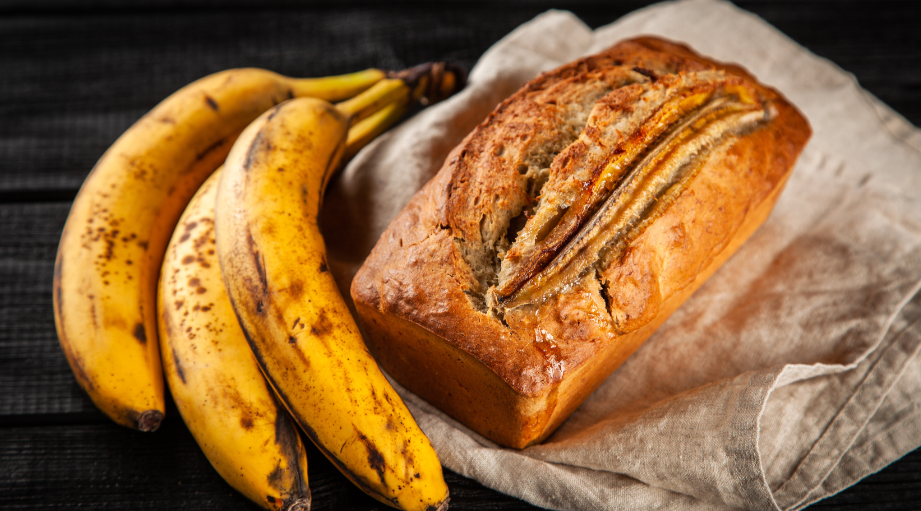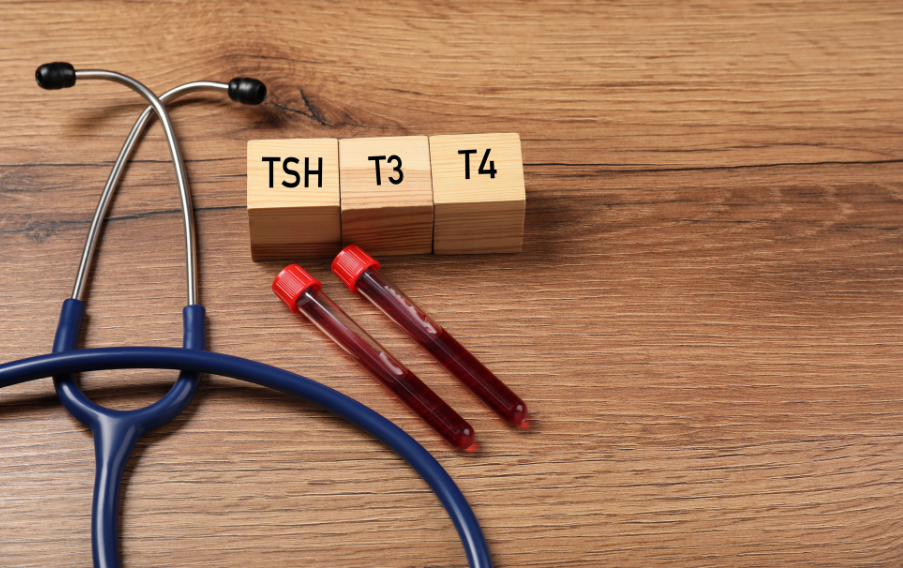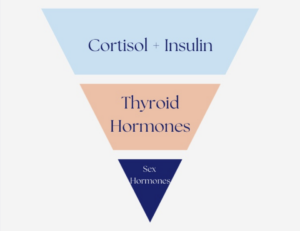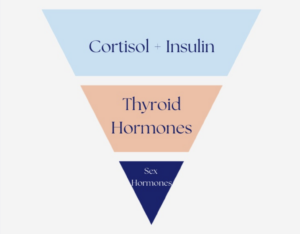Self Care Cocktail Recipe
SELF CARE COCKTAIL RECIPE
05 / FEBRUARY / 2025
SHEREE'S HEALTH DIARIES

Self-care cocktail recipe… (not one you can drink)
We all know just how important self-care is, but for some reason, especially as women, it tends to take a backseat and we put the needs of others before ourselves. So… let me appeal to a different side of you before we dive into the self-care cocktail recipe designed to leave you feeling refilled and your cup overflowing!
FACTS:
*side note, thank you Rachel @rooted.strategy for these epic self-care facts!
Working parents spend roughly 66 hours a week either at their jobs or taking care of their families
Mild dehydration can make you irritable, anxious and tired
Listening to your favourite song actually changes your brain chemistry
A single night of sleep deprivation can increase anxiety by up to 30%
The less you sleep, the hungrier you are
Cortisol levels drop significantly after just 20 minutes outside
Indoor air can be 2-5x more polluted than outdoor air (even in big cities)
Trees release compounds that support your body’s immune system
Just imagining a workout can actually strengthen your muscles
…now are you ready to take some time out for yourself?
✨ Ingredients for the ultimate self-love experience:
🌊 A 45-minute walk along the beach: move your body, breathe in that salty air, and let the waves work their magic on your stress levels. Bonus points for grounding barefoot!
🛁 30 minutes in a warm, low-tox bubble bath: add Epsom salts to boost magnesium levels (for muscle relaxation) and a few drops of lavender or ylang-ylang essential oil for ultimate calm.
📚 1 hour of uninterrupted reading: escape with your favourite smut novel, a soulful memoir, or anything that makes you smile.
☕️ A warm mug of adaptogenic hot cacao or herbal tea: blend cacao, ashwagandha, and cinnamon to soothe your stress response and support hormone balance or indulge in a soothing camomile herbal to unwind
🌿 5 minutes of intentional gratitude journaling: Reflect on 3 things you’re grateful for, anchoring your day in positive vibes.
💆♀️ 15 minutes of skincare TLC: Apply a detoxifying face mask, try gua sha for lymphatic drainage, or enjoy a cooling under-eye mask whilst listening to your favourite playlist or podcast
☀️ 10 minutes of sunshine: Get that daily dose of vitamin D for mood and immune support—bonus points if you sip your tea outdoors.
✨ Shake it all together for the perfect recipe for mind-body balance and glowing vibes. ✨🍸🌸

SHEREE BEAUMONT
Holistic Nutritionist, Personal Trainer & Wellness Coach I empower women like you to transform their lives, understand their bodies and feel their best from the inside out!
POPULAR
Coconut Flour Banana Bread Recipe
COCONUT FLOUR BANANA BREAD
29 / JANUARY / 2025
SHEREE'S HEALTH DIARIES

Cook Time: 45 minutes
Prep Time: 15 minutes
Servings: 8 slices
INGREDIENTS
- 1 cup coconut flour
- 3 ripe bananas, mashed
- 4 eggs
- 1/4 cup coconut oil, melted
METHOD
- Preheat your oven to 350°F (175°C) and grease a loaf pan.
- In a bowl, mix coconut flour, mashed bananas, eggs, and melted coconut oil until smooth.
- Pour the batter into the loaf pan.
- Bake for 45 minutes or until a toothpick inserted into the centre comes out clean.
- Allow the banana bread to cool before slicing and enjoy!

SHEREE BEAUMONT
Holistic Nutritionist, Personal Trainer & Wellness Coach I empower women like you to transform their lives, understand their bodies and feel their best from the inside out!
POPULAR
3 Reasons You Wake Up Bloated
3 REASONS YOU ARE WAKING UP BLOATED
15 / JANUARY / 2025
SHEREE'S HEALTH DIARIES

Waking up bloated? Here's 3 reasons why...
1. You ate a late meal...
When you consume a late meal, i.e. only a couple of hours or less before you got to bed, it can impact the body's digestive processes during the night. Especially if it was one rich in complex carbohydrates.
As the body metabolises food, there is an increase in insulin secretion, promoting glycogen storage. However, late-night meals may not allow sufficient time for the body to utilise or burn off the stored glycogen, leading to water retention and a sensation of bloating in the morning.
Additionally, the delayed emptying of the stomach during sleep can contribute to a feeling of fullness and bloating upon waking.
2. You're stressed out...
Cortisol, known as the stress hormone, plays a crucial role in the body's fight-or-flight response. Elevated cortisol levels, often associated with chronic stress, can impact digestive functions.
Scientific studies suggest that stress-induced cortisol release may lead to changes in gastrointestinal motility, promoting bloating and discomfort.
Moreover, stress can influence our food choices, often triggering us to reach for high-fat or high-sugar foods, which can further contribute to bloating.
3. You've got a deeper gut issue...
We're talking food sensitivities, impaired or lack of digestive enzymes, dysbiosis in the gut or SIBO (small intestinal bacterial overgrowth)
Reactions to specific foods, such as gluten or lactose, can contribute to bloating, not producing enough digestive enzymes can inhibit the breakdown of our foods, and poor microbiome health i.e. SIBO or dysbiosis can cause bloating because there's an imbalance of good vs bad bacteria and that excess of bad bacteria can ferment food and produce gas causing bloating.
Wanna learn how to beat the bloat?
In my free 5-day beat the bloat challenge I'm sharing exactly how you can stop the bloating for good, and see changes in as little as 3 days!
Click here to register for free!

SHEREE BEAUMONT
Holistic Nutritionist, Personal Trainer & Wellness Coach I empower women like you to transform their lives, understand their bodies and feel their best from the inside out!
POPULAR
Top 10 Podcasts Of 2024
TOP 10 PODCASTS OF 2024
4 / DECEMBER / 2024
SHEREE'S HEALTH DIARIES

What an incredible year in podcasting it has been… we @thewildandwellcollective
are so grateful to every single one of our listeners, as we will have hit over 65 episodes by the end of the year and 1950+ downloads! So if you have been tuning in each week, thank you! And if you haven’t - uhhh hello, have you been living under a rock? Hahaha kidding! But seriously, it’s never too late to start bingeing episodes here!
We’ve had some incredible guests this year and also recorded some killer solo episodes, so I wanted to do a little end of year round up of yours and our favourite episodes! I hope you enjoy 😀
OUR TOP 10 PODCASTS
- Microbial Marvels: Navigating the World of Gut Health with Kiran Krishnan (Part 1)
In this episode, we welcomed an incredible microbiologist and health expert, Kiran Krishnan. We dove into the world of microbiology and the groundbreaking Human Microbiome Project that Kiran has been passionately involved in since its inception in 2007. Together, we explore the fascinating concept of leaky gut, its profound impact on health, and how it can lead to food intolerances. Kiran challenges conventional approaches, discussing the pitfalls of overusing antimicrobials and the limitations of solely eliminating foods to address gut issues. Tune in here! - Unlocking the Potential of Holistic Brain Health With Caleb Greer
In this episode, we welcome Caleb Greer, a Holistic Health Care expert who specialises in brain health. We dive into his personalised approach to cognitive enhancement and brain health optimization. He also shares insights into the world of nootropics, the transformative potential of ketamine therapy for addressing anxiety, depression, and performance enhancement as well as the importance of personalised treatment plans, intention setting, and professional guidance through these different treatments. Get ready to explore holistic approaches to your brain health for optimal well-being - listen here! - The Sleep Solution: How to Transform Your Sleep Routine
This episode explores the crucial topic of sleep and its impact on our overall health and energy levels. We address common causes of fatigue such as thyroid health and hydration and also share some practical steps you can take to improve sleep quality. We also touch on the role of supplements like magnesium, glycine, and L-theanine in supporting sleep. This episode is packed with tips to help you get intentional about your sleep habits and prioritise self-care so you can harness the transformative power of quality sleep - listen here! - The Feminine Unveiled: Somatic Wisdom, Business Strategy, and Embracing Your Unique Journey with Beth Wood
In this episode, we had the privilege of hosting Beth Wood, an expert in somatic coaching and business strategy for women. Beth shared valuable insights on embracing the feminine design, covering topics such as cycle syncing, balancing masculine and feminine energies, and the beauty of somatic healing. Drawing from her personal journey of overcoming burnout, Beth talks about the importance of listening to our bodies and integrating intuitive practices into our lives. Don't miss this empowering episode that explores the depths of feminine wisdom! Listen here! - Glowing from Within: Expert Insights on Skincare with Tessa Jenkins
In this episode, we welcome guest expert Tessa Jenkins, the savvy entrepreneur behind Beauty Assets Clinic and Skin by Beauty Assets Skincare. We dive into the significance of holistic care, debunking misconceptions about oily skin and acne along the way. Tessa also shares insights on cutting-edge technologies such as exosomes and their potential in addressing various skin concerns. If you’re ready to achieve glowing, healthy skin, you don’t want to miss this one! Listen here! - From Pain to Purpose: Dr. Amie Hornaman's Journey to Thyroid Health Advocacy
We had the pleasure of speaking with Dr. Amie Hornaman, also known as "The Thyroid-Fixer," an expert in thyroid and hormone optimization. Dr. Amie shared her journey from competitive fitness to becoming a thyroid health advocate, driven by her own experience of misdiagnoses and ineffective treatments. We talked about the importance of a holistic approach to health, going beyond conventional lab values and empowering individuals to take control of their well-being. If you are ready to achieve optimal thyroid and hormone health, tune in to this episode here. - Nourishing Your Body for Vitality: A Conversation with Dr. Tara Campbell
In this episode, we are chatting with Dr. Tara Campbell, a distinguished naturopathic doctor and the visionary behind Higher Health Center. Our discussion dives into the often-overlooked hormone melatonin, unravelling its pivotal role in circadian rhythm regulation and antioxidative prowess. Dr. Tara also talks about the benefits of micronutrient replenishment via IV therapy, highlighting the advantages of directly infusing nutrients into the bloodstream for heightened cellular vitality. This episode is jam-packed with information around mitochondrial health, hormonal equilibrium, and actionable wellness strategies to empower you with invaluable insights and tangible steps toward optimising your well-being and vitality - listen here! - Unlocking the Power of Nutrigenomics with Jill Hillhouse
We had the pleasure of hosting Jill Hillhouse, a seasoned nutritional practitioner with expertise in personalised nutrition and lifestyle plans. Together, we discuss the fascinating world of nutrigenomics, uncovering how specific foods influence our genes and how gene variants respond to nutrition. We cover everything from methylation's critical role in DNA synthesis, neurotransmitter function, hormone regulation and how genetic variations can impact these processes to estrogen detoxification, fat metabolism, carbohydrate digestion, and the role of genetic testing in personalised nutrition. If you’re ready to learn about the power of nutrigenomics, tune in here! - Microbial Marvels: Navigating the World of Gut Health with Kiran Krishnan (Part 2)
Tune in to the second part of our riveting exploration into the world of probiotics, spore-based bacteria, and their phenomenal impact on our gut health. In this episode, we delve even deeper, uncovering the intricate dance between our ancestors and the environment, the genius of bacillus endospores, and the mind-bending concept of quorum sensing. Safety concerns for children and the immunocompromised are addressed, providing a comprehensive understanding of the nuanced world of probiotics. Listen here! - Understanding Fasting for Health and Hormone Balance
In this episode, we tackled the complexities of fasting, focusing on its suitability for women and men at different life stages. We chatted about the benefits of intermittent fasting for insulin sensitivity as well as metabolic flexibility but also shared some instances where you need to take caution before deciding to fast. We also shared insights on optimal fasting times for women and the benefits of bone broth fasting. You can tune in here!

SHEREE BEAUMONT
Holistic Nutritionist, Personal Trainer & Wellness Coach I empower women like you to transform their lives, understand their bodies and feel their best from the inside out!
POPULAR
The Surprising Benefits Of Creatine For Women
BEYOND MUSCLE: THE SURPRISING BENEFITS OF CREATINE FOR WOMEN
6 / NOVEMBER / 2024
SHEREE'S HEALTH DIARIES

When most people hear the word "creatine," they think of athletes chugging pre-workout shakes and bodybuilders pumping iron. But it’s time we reframe creatine as more than just a gym supplement—especially for women. This powerhouse compound offers far-reaching benefits that extend beyond muscle strength, supporting everything from brain health to hormone balance. And it is one of my personal non-negotiable faves that I have on the daily!
Here’s why adding creatine to your wellness routine might just be one of the smartest moves you make.
WHAT IS CREATINE?
Creatine is a naturally occurring compound stored in our muscles and brain. It plays a key role in producing energy, especially for short bursts of high-intensity activity. While your body can make some creatine on its own, it’s mostly obtained from animal products like red meat and fish.
However, like many nutrients we need - our bodies can often do with a little extra top up which is why I LOVE PUSH Gummies and take them post-workout (and every day for my brain health). Supplementing with creatine ensures your body has enough of this energy-boosting molecule, but its impact extends far beyond physical performance.
THE RESEARCH BEHIND CREATINE
Creatine is actually one of the most researched supplements in the world. It has been studied for over 50 years and proven to be 100% effective for brain function and muscle development. Beyond these, it has been shown to have a variety of other benefits, including:
- Supports brain function
- Boosts energy production
- Improves bone density
- Reduces muscle wasting
- Provides neuroprotection
- Enhances memory and cognitive function
- Facilitates rehabilitation from injuries
- Improves hydration of cells
- Lowers myostatin levels
- Promotes anabolic hormones
- Helps to lower blood sugar
- Enhances overall performance
- Supports methylation
- Contributes to sperm, eye, digestive, and skin health
But let’s dive into why this supplement is extra supportive for females…
WHY CREATINE ISN'T JUST FOR MUSCLE BUILDING
- Cognitive Support & Brain Health
Creatine supplementation can enhance brain function and mental clarity by improving energy production in brain cells. This can help with:
- Memory: Especially useful during mentally demanding periods or as we age.
- Focus and concentration: Great for those experiencing brain fog, a common symptom of hormonal imbalances.
- Mood regulation: Creatine may help alleviate symptoms of depression by supporting neurotransmitter function.
Why it matters: If you feel scatterbrained or low on energy during certain phases of your menstrual cycle, creatine could offer the boost you need to stay sharp and motivated. I actually notice a difference on the days I may forget to take it in terms of cognitive function.
2. Hormonal Health & PMS Relief
Creatine can play a supportive role in managing PMS symptoms and hormonal imbalances. Since it helps the body produce energy more efficiently, it can offset the fatigue, brain fog, and mood swings often associated with premenstrual syndrome. Additionally, creatine’s ability to enhance neurotransmitter function may help stabilise mood fluctuations.
Why it matters: If you struggle with low energy or mood dips during your luteal phase (the two weeks before your period), creatine may help smooth the hormonal roller coaster.
3. Bone Health & Menopausal Support
For women entering perimenopause and menopause, the decline in estrogen can result in decreased bone density and a higher risk of osteoporosis. Research suggests that creatine supplementation, combined with resistance training, may improve bone strength and reduce the loss of lean muscle mass during ageing.
Why it matters: Adding creatine to your routine during midlife can protect your bones and muscles, helping you maintain strength and vitality well into the future.
4. Energy and Recovery
Creatine doesn’t just support energy during workouts—it also reduces post-exercise fatigue and speeds up recovery. This means you can stay more active and consistent with your routine without hitting a wall of exhaustion.
Why it matters: Whether you’re lifting weights or managing the daily grind, creatine helps keep your energy levels stable so you can stay on top of your game.
HOW TO ADD CREATINE TO YOUR ROUTINE
If you’re curious about trying creatine, here are a few things to keep in mind:
- Dosage: A typical dose is 3-5 grams per day. Most research supports daily use for long-term benefits.
- Timing: You can take creatine at any time of day, though many people include it in their post-workout routine.
- Type: Look for creatine monohydrate, the most well-researched and effective form. My favourite is the PUSH Gummies which you can find online here, they have even given me a special discount code SHWELLNESS for you! Their ingredients are super clean and 100000% SHWellness approved!
Pro tip: Creatine is tasteless and dissolves easily in water, coffee, or smoothies, making it easy to add to your routine without any fuss.
THE BOTTOM LINE
Creatine isn’t just for bodybuilders—it’s for any woman looking to support her brain, hormones, bones, and energy levels. Whether you’re managing PMS, navigating menopause, or just want to feel sharper and more energised, creatine offers a range of benefits that go far beyond muscle health.
By adding this supplement to your wellness toolkit, you’re giving your body extra support to thrive—inside and out.

SHEREE BEAUMONT
Holistic Nutritionist, Personal Trainer & Wellness Coach I empower women like you to transform their lives, understand their bodies and feel their best from the inside out!
POPULAR
Fix Low Energy And Slow Metabolism
IS THIS THE REAL REASON YOUR METABOLISM IS SLUGGISH… AND YOUR ENERGY LEVELS ARE LOW?
30 / OCTOBER / 2024
SHEREE'S HEALTH DIARIES

The real reason you're not seeing results - part two... If you missed part one, be sure to go back and give it a read (click here) as this builds on what we’ve already discussed!
One of the biggest frustrations I hear from women is how their male counterparts lose weight so much easier than they do. And whilst I wish I could say it wasn’t true, in many ways it is because women are created so differently to men
This is not a bad thing, it’s just an issue because for the longest time, women have been treated like small men in the health and fitness industry. When in reality 95% of all the studies done and published in the scientific literature are all based on men. Then we take it and run with it thinking this next trend is going to be the answer.
Repeat after me: WOMEN ARE NOT SMALL MEN (right @drstaceysims)
As females, your metabolism is governed by your hormones. The primary hormones women typically think are the problem are estrogen + progesterone. THESE ARE NOT THE ANSWER
Think of your hormones as a funnel, what happens at the top, affects the ones at the bottom. Therefore, we started with cortisol and insulin. However, it doesn’t stop there. The incidence of hypothyroidism and thyroid conditions like Hashimoto’s are consistently on the rise, which is why we need to take a closer look at what’s going on with the thyroid hormones.
You may know that your thyroid is the butterfly shaped endocrine gland in your neck/throat that has something to do with your energy. But are you aware of the impact it has on your metabolism and other hormones? Let’s dive in.

Think of your thyroid as the thermostat for your metabolism. It controls how efficiently your body burns energy.
The main thyroid hormones—T3 (triiodothyronine), T4 (thyroxine), and TSH (thyroid-stimulating hormone)—work together in this process.
BREAKING DOWN YOUR THYROID HORMONES
Let’s start with the most commonly known one, the one you’ve most likely had tested if you’ve done a blood panel recently.
TSH (Thyroid-Stimulating Hormone):
This is produced by the pituitary gland, TSH signals the thyroid to produce T3 and T4. High TSH levels often indicate that the body is trying to stimulate the thyroid to produce more hormones because they are low.
T4 (Thyroxine):
This is the primary hormone produced by the thyroid gland. T4 serves as a reservoir for energy, but it needs to be converted into T3 to be active.
Low levels of T4 can lead to a sluggish metabolism, weight gain, fatigue, and even depression.
T3 (Triiodothyronine):
T3 is the active form of thyroid hormone, responsible for regulating metabolism and energy levels. It impacts nearly every cell in the body.
Low T3 can lead to symptoms like low energy, weight gain, hair loss, and difficulty concentrating.
When thyroid function is compromised, a condition known as hypothyroidism, you may experience:
- Fatigue
- Weight gain
- Sensitivity to cold
- Dry skin and hair
- Constipation
- Brain fog
These symptoms arise because low thyroid hormone levels slow down metabolism, making it harder to lose weight and maintain energy.
WHAT CAN YOU DO TO BALANCE YOUR HORMONES?
Actionable items to support a balanced thyroid + optimal metabolism:
Nutrients:
- Ensure you're consuming adequate iodine (found in fish, dairy, and kelp salt), selenium (found in Brazil nuts and seafood), and zinc (found in oysters, meats and eggs). These nutrients are vital for the production and conversion of thyroid hormones.
Nurture your nervous system
- Chronic stress can impair thyroid function by increasing cortisol, which interferes with the conversion of T4 to T3.
- Incorporate nervous system supporting activities like yoga, meditation, or simple breathing exercises to keep your hormones balanced.
Nourish your gut:
- 20% of T4 is converted to T3 in the gut. A disrupted gut microbiome can interfere with this process.
- Add fermented foods like sauerkraut or kefir and a high-quality probiotic to support digestion and thyroid hormone conversion along with plenty of water to promote digestion and nutrient absorption, which are essential for thyroid function.
Focus on these 3 N’s: nutrients, nurturing your nervous system, and nourishing your gut health to support your thyroid and metabolism.
When your thyroid is functioning optimally, your metabolism will rev up, making weight loss and energy gain feel achievable and sustainable.

SHEREE BEAUMONT
Holistic Nutritionist, Personal Trainer & Wellness Coach I empower women like you to transform their lives, understand their bodies and feel their best from the inside out!
POPULAR
Womens Weight Loss And Hormone Health
FAT STORAGE, WEIGHT LOSS & HORMONES: what you need to know as a woman
16 / OCTOBER / 2024
SHEREE'S HEALTH DIARIES

STOP eating less and moving more hoping for weight loss. Weight loss is different for women. You need to reset your hormones to reset your metabolism
As females, your metabolism is governed by your hormones. The primary hormones women typically think are the problem are estrogen + progesterone. THESE ARE NOT THE ANSWER
Think of your hormones as a funnel, what happens at the top, affects the ones at the bottom. Therefore, we have to start with cortisol + insulin:

PHASE ONE: INSULIN
- Insulin is a hormone released when you eat (particularly carbs)
- It’s main job is to help move sugar from your blood into your cells to use for energy
- When you eat, blood sugar rises and insulin acts like a key, unlocking cells to let the sugar in
- If your body is sensitive to insulin, it uses it to control blood sugars effectively
- To support your metabolism you need increased insulin sensitivity to help balance your blood sugars + your hormones
Actionable items to support insulin sensitivity:
Movement
- going for a walk after a meal even for 10 minutes increases insulin sensitivity and the body’s ability to regulate glucose (blood sugars)
- lift some heavy sh*t - weight training is one of the best ways to re-sensitise insulin
Macros + meal timing
- no, not counting your macros or calories, but getting enough protein and not-skipping meals will keep your blood sugar levels stable
Metabolic support
- sometimes your body needs a little extra help, supplements like inositol can give your body extra assistance in regulating your blood sugars making it easier for insulin to do its job.
PHASE TWO: CORTISOL
- Cortisol is your body's main stress hormone. It’s released during times of stress (emotional, physical, or even lack of sleep).
- It’s always trying to help you + keep you safe
regulating energy, anti-inflammatory effects, enhances mental clarity, and balances your immune response
IN SHORT-TERM BURSTS
- But when cortisol levels remain high due to chronic stress, it can cause your body to store fat, particularly around the belly, and disrupt other hormones, including insulin.
- If your body is constantly in a stressed state, your metabolism slows, and it becomes harder to lose weight
THIS LEADS TO NERVOUS SYSTEM DYSREGULATION + POOR METABOLIC FLEXIBILITY
- Aka you are stuck in ‘fight or flight’ and your body doesn’t burn fat only glucose
- To get your body burning fat again, you need to regulate your nervous system so your body feels safe
Actionable items to support balanced cortisol:
Breathwork
- the easiest way to communicate to the body that it is safe and can move out of ‘fight or flight’ is through breaths
- take 5-6 deep belly breaths when you wake, are stuck in traffic, before meals to teach the body it is safe consistently
Bedtime routine
- cortisol thrives on having a regular rhythm - your circadian rhythm to be exact, get your 7-9 hours.
- keep your bedtime consistent, stay away from screens and do something that helps you wind down + feel calm before bed
Balanced exercise
- exercise is a form of stress on the body, HIIT workouts are the biggest stress and if our nervous system is already wired these can do more harm than good
- focus on lifting weights, going for walk and keep the HIIT to max 2 x per week in your follicular + ovulatory phase
Remember more isn’t always better... slowing down communicates safety and restriction isn’t the solution
Focus on these 3 M’s & B’s and your body will feel safe enough to burn fat and have happy hormones!

SHEREE BEAUMONT
Holistic Nutritionist, Personal Trainer & Wellness Coach I empower women like you to transform their lives, understand their bodies and feel their best from the inside out!
POPULAR
10 Reasons You Need To Try A Float Tank
10 REASONS YOU NEED TO BE FLOATING (like yesterday)
18 / SEPTEMBER / 2024
SHEREE'S HEALTH DIARIES

Floating has become increasingly popular in recent years, for all kinds of reasons (many of which are listed below). If you’re not sure what floating is… healthline defines it as “a sensory deprivation tank, also called an isolation tank or flotation tank, is used for restricted environmental stimulation therapy (REST). It is a dark, soundproof tank that is filled with a foot or less of salt water.”
That salt water is Epsom salts which allows you to float atop of it and contain high doses of magnesium which is part of what provides such amazing benefits.
I remember being a little nervous about getting into a pod, I’m not overly claustrophobic, but hey… still a bit strange. However, closing my eyes and shutting off from the world for an hour was incredible. I make sure I go at least once a month. My favourite local one is Infinity Float (who have also given me a discount to pass onto you for 20% OFF: ‘SHW20’.
10 REASONS YOU'LL LOVE FLOATING
- Reduced Stress + Anxiety: floating in a sensory-deprivation tank induces a state of deep relaxation, helping to alleviate stress + anxiety and promote a sense of calm for the nervous system (aka reduced cortisol)
- Pain Relief: the buoyancy of the saltwater can ease muscle and joint pain, making floating a therapeutic option for those with chronic pain conditions - loved this for my knee!
- Improved Sleep: regular floatation sessions have been linked to better sleep quality... Hello, you are floating in 550kg of magnesium, and I slept like a baby after mine
- Enhanced Mental Clarity: sensory deprivation allows the mind to quiet down, fostering mental clarity, improved focus, and heightened creativity.
- Muscle Recovery: floating is a tool for muscle recovery, as it can reduce lactic acid buildup and accelerate the healing of muscle tissue, and improves circulation
- Strengthened Immune System: the relaxation response triggered by floating may contribute to a strengthened immune system, helping the body defend against illnesses.
- Mind-Body Connection: floating provides an opportunity for introspection and a deeper connection between the mind and body, aiding in self-discovery and personal growth.
- Relaxation: floating provides a unique opportunity for mindful relaxation, allowing us to disconnect from external world which we very rarely give ourselves the opportunity to do.
- Elevated Mood: floating stimulates the release of endorphins, promoting a positive mood and potentially acting as a natural antidepressant.
- Enhanced Creativity: the sensory-deprivation environment can encourage creative thinking and problem-solving, making it a valuable tool for artists and professionals seeking innovative ideas.
I particularly noticed the creativity and left feeling super recharged and re-energised! I cannot wait to go back to @infinityfloat again!

SHEREE BEAUMONT
Holistic Nutritionist, Personal Trainer & Wellness Coach I empower women like you to transform their lives, understand their bodies and feel their best from the inside out!
POPULAR
What Your Food Cravings Are Really Trying To Tell You
WHAT YOUR FOOD CRAVINGS ARE REALLY TRYING TO TELL YOU
4 / SEPTEMBER / 2024
SHEREE'S HEALTH DIARIES

Whether it’s chocolate, chips, peanut butter, a steak or even a piece of fruit there’s something your body is trying to communicate with you when you have cravings.
I recently went away with some friends and it was so interesting to observe the cravings they were gravitating towards. After sharing with me what a stressful time they’ve been having (work + family stress) it was obvious to me their cortisol levels would be in a chronically elevated state and they were living in fight or flight.
What they didn’t realise is how incredibly intelligent their body was at ensuring they were getting the extra top up of nutrients they needed.
You see, when we are in a state of fight or flight (aka sympathetic nervous system dominance); we are more stressed - the more stressed we are, the more of certain nutrients we need.
Not only that, but high cortisol levels will suppress the immune system, cause the body to run primarily on glucose and use up a lot of your nutrient stores much faster. Hence why the carb cravings can go through the roof during this time.
So what was my friend craving, and what does it mean?
WHAT YOUR CRAVINGS MEAN
CRAVING CHOCOLATE?
Chances are if you’re craving chocolate, there’s a magnesium deficiency. The more stressed we are the more magnesium your body uses. Chocolate (particularly dark chocolate) contains high levels of magnesium.
50g of a high quality dark chocolate often contains more magnesium than most good quality magnesium supplements. I recommend getting at least 70%+ dark chocolate with no/low sugar, but I do also recommend that a high quality magnesium supplement is taken daily.
Solution: Magnesium bisglycinate is my go to (to avoid funky bowel movement changes and to calm the nervous system) - dosage starting around 300 mg.
CRAVING SALTY FOODS?
Chips, pretzels, salted nuts… all feedback your adrenals are constantly being stimulated. What do the adrenal glands do? Produce cortisol and adrenaline - hello nervous system again (starting to get the picture?).
Salt isn’t ‘bad’ like we’ve been led to believe. Sodium is one of the most required nutrients in the body, it’s an electrolyte and we need it to keep us hydrated. We’re 70% water after all and detoxification, mood, energy… everything is negatively impacted if we aren’t in a hydrated state.
So, having the salt isn’t the issue, it is normally what the salt is covering - e.g. the fried potato or the gluten filled pretzel. Salted nuts are fine, but often it is the overconsumption of these that affects our goals.
Solution: add kelp or natural salt to your meals, or to your water (yes I know that sounds weird), which is why my go-to is to drink electrolytes. Particularly around my workout or first thing in the morning.
CRAVING FRUIT?
This can be a combination of factors; one it could be the carbs you’re craving to calm down the nervous system (yes they do this). Or it could be the nutrients inside that particular fruit.
In my friend's case, I think it was both. They were eating mandarins like there was no tomorrow! What are mandarins high in? Vitamin C. So not only was the body getting a hit of carbs to help calm down the nervous system from the sugars in the mandarins, but also the extra immune system support from the vitamin C.
Vitamin C can halve our cortisol levels which is great, because chronically elevated cortisol (as aforementioned) suppresses the immune system.
Solution: in periods of higher stress, or just as an added layer of support add in a high vitamin C piece of fruit to your day (e.g. mandarins, oranges, kiwifruit etc), or supplement with 1000 mg of vitamin C.
FINAL THOUGHTS
You can see that for my friend (as for many of my clients), the cravings were all supporting one core imbalance - nervous system dysfunction.
The body is always trying to get back to homeostasis - a place of balance - where the body feels safe and regulated. There are many other cravings that can mean different things too and I am happy to dive into those in another blog (let me know in the comments if you’d like that). But I hope this helps give you a starting point to understand that cravings aren’t there to sabotage you, they’re feedback from the body.
So next time you get a craving, ask yourself… What is my body trying to communicate with me?
With love,
Sheree xo

SHEREE BEAUMONT
Holistic Nutritionist, Personal Trainer & Wellness Coach I empower women like you to transform their lives, understand their bodies and feel their best from the inside out!
POPULAR
How To Get Rid Of Sugar Cravings For Good
HOW TO GET RID OF SUGAR CRAVINGS FOR GOOD
21 / AUGUST / 2024
SHEREE'S HEALTH DIARIES

Tired? You’ll crave sugar.
Hungry for too long? You’ll crave sugar
Stressed out? You’ll crave sugar
There’s not many instances where our body won’t crave sugar if we aren’t giving it what it needs. But your body isn’t trying to work against you…
See, sugar is a quick source of energy, it will pick up your blood sugars, goes directly to the brain and boom… you feel less tired, less hungry and often a little less stressed (because let’s face it, sugar is yum!)
BUT… here’s the catch. It doesn’t last long, and before you know it, you’re back feeling tired, hungry and probably more stressed because you wished you hadn’t indulged in all of that chocolate.
CRAVINGS ARE TYPICALLY DRIVEN BY ONE OF THE FOLLOWING:
- Blood Sugar Dysregulation: aka you’re not eating to support your insulin levels, causing a blood sugar rollercoaster, driving moods, energy, hormones and hunger to be all over the show (and feel out of control)
- Gut Dysbiosis: a fancy way of saying you either have too little good bugs, too many bad bugs or a combination of both. It is often too many bad bugs that are driving the sugar cravings because that’s what feeds them and allows them to multiply
- Fight/Flight/Freeze: a wired, tired, or frozen nervous system means you’re operating out of a sympathetic state - aka survival. When we live here, we rely on glucose (sugar) to function and therefore need more and crave more carbs to help keep ourselves going and ‘calm’ or as close to it as possible.
None of these are optimal ways to be living, and many of the clients I work with are dealing with a combination of one or more of the above.
SO HERE'S WHERE WE START…
Since all of these root causes are a form of stress on the body, we want to help by mitigating the stress and calming down the system. We also know the more stressed we are, the more magnesium we use.
So we start by adding in extra magnesium to your diet, whether this is in the form of a supplement (ideally start with 300mg of magnesium bisglycinate - this is the most bioavailable form of magnesium and won't give you the runs). Or get a high quality dark chocolate with no nasty ingredients, at least 70% cocoa or cacao and very low in sugar (no artificial sweeteners either). Take this daily and watch your sugar cravings disappear.
Also for the month of September in the Conscious Wellness Collective our challenge is ‘CURB THE CRAVINGS’ click here for more info!

SHEREE BEAUMONT
Holistic Nutritionist, Personal Trainer & Wellness Coach I empower women like you to transform their lives, understand their bodies and feel their best from the inside out!








